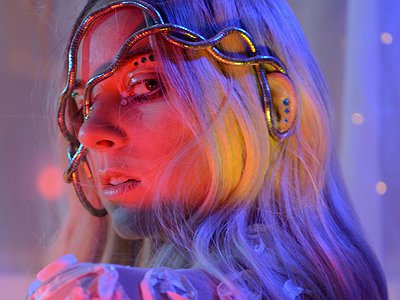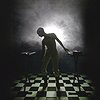Name: Eve Maret
Nationality: American
Occupation: Producer, Singer
Current Release: No More Running on bandcamp.
Recommendations: Paula Rego’s painting entitled “Centaur”; Jon Gibson - Two Solo Pieces
If you enjoyed this interview with Eve Maret, keep up with her activities and releases via her facebook page and Instagram profile.
When did you start writing/producing music - and what or who were your early passions and influences? What what is about music and/or sound that drew you to it?
Early on, I was heavily influenced by sacred and classical music. I grew up Catholic and spent a great deal of time in church. As a shy kid, I loved the experience of singing at mass because it drew me outside of myself. I was no longer the odd ball, but one voice among many. Sound made me feel like I belonged. My parents were also big fans of classical music, and it played in our house around the clock. It was through these experiences that I came to associate music with transcendence and also a sense of being at home.
I first started writing music of my own when I played in a rock band as a teenager, but it wasn’t until my dad passed away in 2016 that I began writing and producing music in a much more intentional way. Making music became a necessity. It was the only way I knew how to process my feelings and find relief.
For most artists, originality is first preceded by a phase of learning and, often, emulating others. What was this like for you? How would you describe your own development as an artist and the transition towards your own voice? What is the the relationship between copying, learning and your own creativity?
A great deal of the learning I’ve done has been through listening. For me, listening is creating. I first found my voice through drumming. My private music teacher taught me the very basics, then invited me to drum during jam sessions with other students. I loved the challenge of mimicking (and anticipating) the phrasing and dynamics of the other instruments using a drum kit, and it was really all I could do. When I purchased my first synthesizer a few years later, I felt like I’d finally found a palate that I could use to express the full range of my experience. Creativity is a form of processing, which is learning, which in its earliest form, is copying. That said, sometimes not knowing lends itself to the most creative state of mind.
What were your main compositional- and production-challenges in the beginning and how have they changed over time?
In the beginning, my main obstacles in terms of composing and producing music were not having the theoretical knowledge nor the tools to create what I imagined. I didn’t know anyone who made electronic music until I went off to college, and I’ve never received any formal music training. Now that the process of making electronic music has been de-mystified through meeting like minded creatives and my own personal studies, I’m still searching for the most direct (and unexpected) media and processes to capture the whole of my expression.
What was your first studio like? How and for what reasons has your set-up evolved over the years and what are currently some of the most important pieces of gear for you?
I haven’t had a proper studio before, really just nooks in spaces where I’ve lived. I guess you could say my first studio was my dorm room in college. I made recordings on my twin XL bed with Garageband, an Alesis Micron synthesizer, and a Fender Stratocaster. My Alesis Micron will always be my favourite and most important piece of gear, because it was the first to give me a glimpse of what’s possible in terms of sound design. I exclusively created with this synth for years, until I got into modular in the fall of 2017. I integrated modular into my set-up after visiting Mills College and seeing the Buchla 100. Hearing Suzanne Ciani’s live Buchla performances from the 70’s also inspired me to dive into modular. Since then, changes to my set-up have been motivated by a desire to make my live performances more dynamic and engaging.
I started using a clarinet, soprano sax, and MIDI Sprout technology when Jayve Montgomery (Abstract Black) and I started collaborating. The Roland VT-3, which I use to process vocals, has become somewhat of a signature. In the past, I was adverse to using a computer for performances, but using Ableton in a live setting has given me access to all of the sounds and production tools I love to use in the studio. In the past few weeks, I’ve been spending a lot of time recording with my Korg MS2000. Currently, I’m obsessed with finding the most portable, most cost-effective and powerful gear for live performances. The search continues!
How do you make use of technology? In terms of the feedback mechanism between technology and creativity, what do humans excel at, what do machines excel at?
Technology is the vehicle for an idea, or a tool that’s used to represent a facet of human consciousness. In terms of the creative process, humans excel at imagining, sensing, and feeling. Machines excel at processing, producing, and offering us feedback. I love technology for the insight it offers me into my ideas.
Production tools, from instruments to complex software environments, contribute to the compositional process. How does this manifest itself in your work? Can you describe the co-authorship between yourself and your tools?
I often reflect on the boundary between myself and the tools I use. I don’t believe that these tools define me, but that a tool captures my expression in a given moment. A tool creates a snapshot. The idea is the image and the tool is the camera. In the moment that the image is created, we are the same.
Collaborations can take on many forms. What role do they play in your approach and what are your preferred ways of engaging with other creatives through, for example, file sharing, jamming or just talking about ideas?
Collaborations are essential to my creativity and well-being as an artist. Making things with other artists inspires my work and stretches me to make compositions that I likely wouldn’t arrive at on my own. It’s always a wonderful surprise. I spend a great deal of time talking through my ideas with other creatives and friends, getting feedback from them and also troubleshooting. I never say no to a jam session, either. I love getting together with artists across genres and disciplines to make something fresh.



